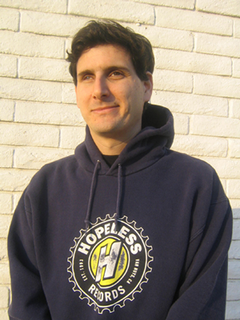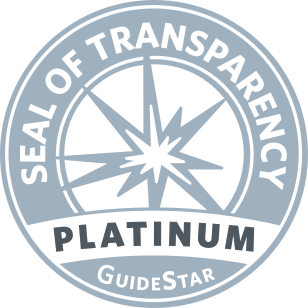A Renaissance Man with Vision
Beacon Stories
An interview with Louis Posen, record label founder and retinitis pigmentosa patient.
By Dr. Tim Schoen

Louis Posen. Photo courtesy of Hopeless Records.
Louis Posen is one of the coolest guys on the planet. He’s president and CEO of Hopeless Records, a company he founded at the age of 21—despite the fact that he was losing eyesight to retinitis pigmentosa (RP). The 43-year-old is also a National Trustee of the Foundation Fighting Blindness. And he got into the music business by accident.
In high school, he was a punk-rock aficionado, buying records and going to every local concert he could. In film school, he came to appreciate the positive influence art, including music videos, had on people’s lives. But this was a time when many punk groups couldn’t afford to produce the high-quality videos to which many viewers were accustomed.
So Posen, looking to fulfill his film-school requirements, contacted some of his favorite groups and asked if he could make videos for them. His first big success was a video for the band NOFX, which was then opening shows for Green Day. After putting together half a dozen more videos for other bands, Posen decided, in 1993, to launch Hopeless Records, so as to continue to bolster fledgling bands.
I recently spoke with Posen about his personal life as well as his business and philanthropic interests.
How has RP affected you?
I was officially diagnosed at age 19—although I had many of the classic symptoms, such as night blindness, as long as I can remember. When I turned 23, I had to give up my driver’s license, and now, at 43, I don’t see very much. So my eyesight has definitely declined, but my vision has not.
Vision has nothing to do with the eyes. It has to do with how your brain perceives the world around you and the future. Whereas eyesight involves the process of light interacting with the retina, which then signals the brain for interpretation.
What is the best thing that has happened to you?
I feel blessed to be married to my wife of 10 years, Michelle, and we are especially blessed to have a daughter, Ellie, who is now 7 years old and in second grade. It’s probably no surprise Ellie wants to be a singer-songwriter. She visits with me frequently in the studio and has already composed and recorded four songs, which I plan to release sometime soon, maybe this year.
Is Hopeless Records a philanthropic record company?
In a way, we are. We’ve sold millions of songs and have many albums debuting in the top 10 of the Billboard 200, including albums from the All Time Low, The Used, Taking Back Sunday and Yellowcard. It shows that people care about what we’re doing.
Instead of just launching bands’ careers, I wanted to connect people and their causes to the bands. So in 1999 we started Sub City, based on the crazy idea that if we gave bands and their fans the opportunity to connect their talent and passion with causes that were important to them, we could make a positive impact through music.
At Sub City, we don’t believe many peoples’ misconception that younger generations are lazy and avoiding real-life issues. We believe bands and their fans are out changing the world by taking action. Our concept to support and spotlight these efforts has already raised more than $2 million dollars and donated to over 50 non-profit organizations, including the Foundation Fighting Blindness.
We are showing that we can all make a difference together, regardless of age, socio-economic status, physical ability or any other factor. Our key signature event is the Take Action Tour, where the bands go on the road and give 10 percent of the door receipts to a charity of their choosing.
And you just started a new endeavor?
It’s called Walking Fish, and it’s still in the early stages. It’s a project where we identify and profile successful people with disabilities. By interviewing these successful individuals, we hope to identify winning characteristics that could help regular people, whether they have a disability or not, achieve their goals.
As you know, a large percentage of disabled people are not employed, and many accept the notion that it’s OK not to try and work. But we’re learning from accomplished professionals that dismissing that notion and assuming you will succeed at whatever you choose to do is self-fulfilling. It seems to be more about how people perceive success and the world around them than it is about disabilities. Again, it all comes back to vision.




